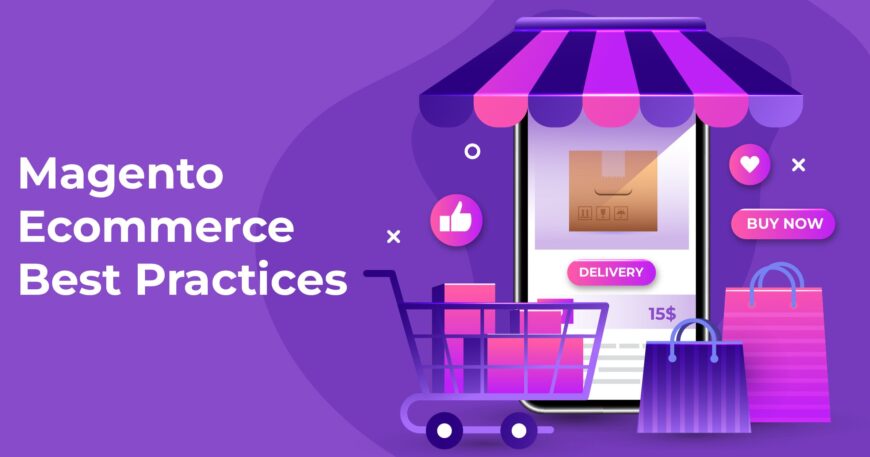Last updated on August 11th, 2025
The world of eCommerce is constantly evolving and developing, so developers need to keep up with the latest trends and technologies. As we look ahead to 2025, Magento Ecommerce will remain one of the top choices for businesses seeking an effective platform for their online store. In this article, we’ll explore some best practices for Magento development that will be essential for success in the future.
Table of Contents
Why Do We Need to Get Ready for Magento Ecommerce Development?
What Is Magento Ecommerce and Why Do Developers Choose It?
Top Best Practices for Magento Ecommerce Development
Frequently Asked Questions (FAQs)
Why Do We Need to Get Ready for Magento Ecommerce Development?
The ever-changing nature of the eCommerce industry means that developers must stay on top of their game and continuously update their skills to remain competitive. Magento Ecommerce is a robust platform that can provide businesses with a practical solution, but only if they understand how to use it correctly. To meet the demands of 2025 and beyond, developers must be prepared for any changes in the Magento Ecommerce development environment.
According to eMarketer, the global ecommerce market is expected to reach $6.3 trillion by the end of 2025.
What Is Magento Ecommerce and Why Do Developers Choose It?
Magento Ecommerce is an open-source ecommerce platform known for its flexibility, scalability, and robust customization options. It enables businesses to create feature-rich online stores tailored to their specific needs, whether B2B, B2C, or hybrid models.
Magento developers often choose this platform because it offers:
- Full control over code and functionality
- A vast library of extensions and themes
- Support for multistore management and localization
- A strong global developer ecosystem
Whether you’re building a simple store or a complex enterprise solution, Magento ecommerce development gives you the freedom to scale and adapt quickly—making it a top choice for high-growth brands.
Top Best Practices for Magento Ecommerce Development:
1. Focus on Performance Optimization
With more consumers shopping online, speed and efficiency are paramount. Magento developers should focus on performance optimization techniques such as caching, minifying code, and using a content delivery network (CDN). These practices will help ensure your website loads quickly and efficiently, keeping customers happy and engaged.
2. Utilize Security Best Practices
As with any platform, security should be a top priority for Magento developers. To ensure your store’s safety and integrity, always use secure passwords, enable two-factor authentication when possible, and regularly update your software. It’s also essential to stay on top of any new threats in the online world and take proactive steps to protect your site from malicious actors.
3. Leverage Machine Learning and Automation.
In the modern world, automation is essential for staying competitive. Magento developers should use machine learning algorithms to automate product recommendations, marketing campaigns, and inventory management tasks. By using these technologies, you can save time and money while still providing a personalized experience for customers.
4. Use DevOps Tools for Smarter Deployment
Magento ecommerce development becomes more efficient and reliable when supported by modern DevOps practices. By integrating CI/CD pipelines, teams can automate code deployment, reduce manual errors, and push updates faster with confidence.
Magento developers should also implement:
- Automated testing tools (e.g., PHPUnit, Selenium) to catch bugs early
- Version control systems (like Git) for team collaboration
- Magento-specific DevOps tools that support staging, rollback, and multi-environment setup
These practices help streamline development workflows, boost site stability, and ensure that every deployment enhances—not disrupts—your ecommerce experience.
5. Integrate Online and Offline Experiences
Customers expect a seamless experience when they are shopping online or in-store. Magento commerce developers should strive to bridge the gap between digital and physical experiences by integrating features such as click-and-collect, order tracking, loyalty programs, and more.
6. Adopt Progressive Web Applications
Mobile usage is increasing daily, so Magento commerce developers must be prepared. To optimize for mobile, you should use advanced web applications (PWAs). These are web-based apps that provide a native app-like experience on mobile devices. PWAs also allow customers to use your store even when they don’t have an internet connection, making them ideal for mobile commerce.
7. Leverage Cloud Technology
Cloud technology is becoming increasingly popular among eCommerce businesses, and Magento commerce developers should take advantage of its many benefits. Cloud hosting can provide improved reliability and scalability, allowing you to adjust your store as needed without any downtime. Additionally, leveraging cloud technology can help reduce the cost of hardware, making it more affordable for businesses of all sizes.
8. Embrace Third-Party Integrations
Integrating with third-party services effectively adds new features and capabilities to your store without needing custom development. Magento developers should explore popular third-party services such as payment gateways, shipping providers, customer feedback tools, etc. This can give customers a better experience while reducing development time and cost.
9. Address High-Traffic Event Readiness
Magento ecommerce stores often face performance bottlenecks during high-traffic events like Black Friday, Cyber Monday (BFCM), or flash sales. Without proper optimization, slow load times—or worse, site crashes—can lead to massive revenue loss and damage brand trust.
To prevent this, Magento developers should:
- Run load testing in advance to simulate peak traffic
- Leverage auto-scaling and cloud hosting to handle demand spikes
- Optimize database queries and cache configuration for faster response times
- Use full-page caching and a CDN to offload server strain
Planning ahead ensures your Magento ecommerce site stays fast, stable, and ready to convert when traffic surges.
10. Optimize for Voice Search
As voice search becomes more popular, Magento commerce developers must ensure their stores are optimized for this new form of interaction. This includes providing concise, relevant answers to questions and using schema markup to ensure your store is easily discoverable by voice assistants like Alexa and Google Home. Additionally, focus on creating content with natural language that targets long-tail keywords to give customers the most accurate answers.
11. Optimize for Localization
As consumers become more global, ensuring that your store is localized and available in multiple languages is essential. Magento commerce developers should use plugins like Loco Translate or WPML to quickly translate their sites into different languages and localize features such as currency and time zones. Additionally, you can use geolocation services to personalize experiences for customers in other regions.
12. Balance AI with Human-Led Strategy
While AI tools in Magento ecommerce help automate product recommendations, analyze customer behavior, and streamline marketing efforts, they work best when paired with human expertise. Top Magento ecommerce development agencies strike this balance by using AI to surface insights—then applying strategic judgment to act on them.
For example, AI might identify a customer segment likely to churn, but it’s the human-led strategy that crafts the right retention campaign, tone, and timing. This synergy results in smarter, more personalized experiences that drive better engagement and ROI.
Rely on automation to scale, but always keep human oversight at the core for strategic direction.
13. Think Ahead
The world of eCommerce is constantly changing, and Magento commerce developers need to keep up with the latest trends to stay ahead of the competition. Staying informed on new technologies and advancements can help you better anticipate customer needs and create a more user-friendly experience. Additionally, don’t be afraid to experiment with ideas to see what works best for your store.
Frequently Asked Questions (FAQs)
1. How to develop Magento ecommerce?
Magento development involves theme setup, extension installation, store configuration, custom coding, performance tuning, and security hardening. Partnering with a skilled Magento ecommerce development agency can streamline the entire process.
2. What does a Magento developer do?
Magento developers build, customize, and maintain online stores using the Magento platform. Their tasks include coding, integrating extensions, optimizing UX, and resolving technical issues to ensure smooth operation.
3. What is Magento ecommerce?
Magento ecommerce refers to using the Magento platform to run and scale online stores. It provides open-source flexibility, powerful customization options, multistore capabilities, and a strong developer ecosystem ideal for both B2C and B2B businesses.
Conclusion
Magento commerce developers are on the cutting edge of eCommerce development, and staying up-to-date on the latest trends and best practices is essential. By focusing on customer experience, integrating online and offline experiences, leveraging cloud technology, embracing third-party integrations, optimizing for voice search, localizing your store, and staying informed, you can ensure your Magento ecommerce store is optimized for success in 2025 and beyond.
Are you looking for a professional Magento ecommerce development agency? Vserveecommerce is here to help you. We at Vserve offer a high-performing, scalable Magento ecommerce solution that motivates you to discover the potential of your e-commerce site since it is packed with helpful out-of-the-box features.
Want to Maximize Your Magento Store’s Performance?
Let our Magento ecommerce development agency audit your store and recommend high-ROI fixes.





